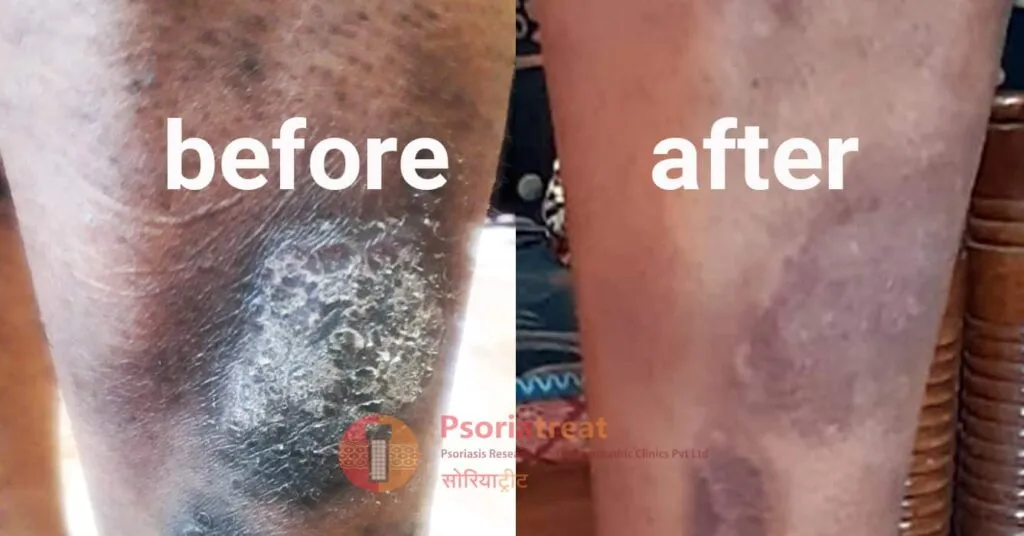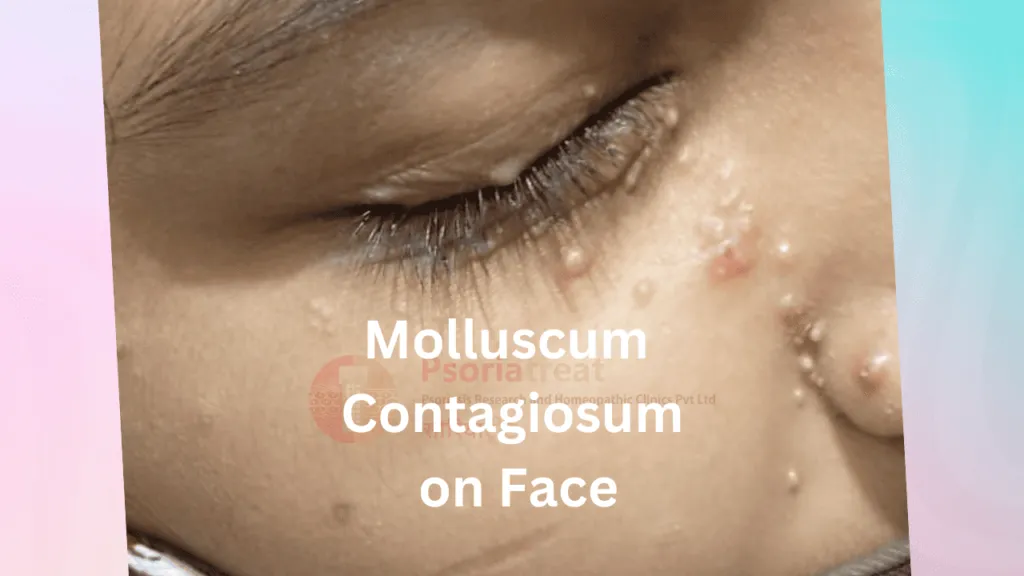Erythrodermic psoriasis is a severe and often life-threatening form of psoriasis, characterized by widespread inflammation and exfoliation of the skin. As a dermatologist and homeopathic practitioner, I have encountered many challenging cases, but one, in particular, stands out—a 54-year-old male whose persistent psoriasis eventually became unresponsive to conventional treatments. In this article, I share his story and the remarkable role homeopathy played in his healing journey.
The Patient’s Journey: From Conventional Treatment to Homeopathy
A History of Struggle
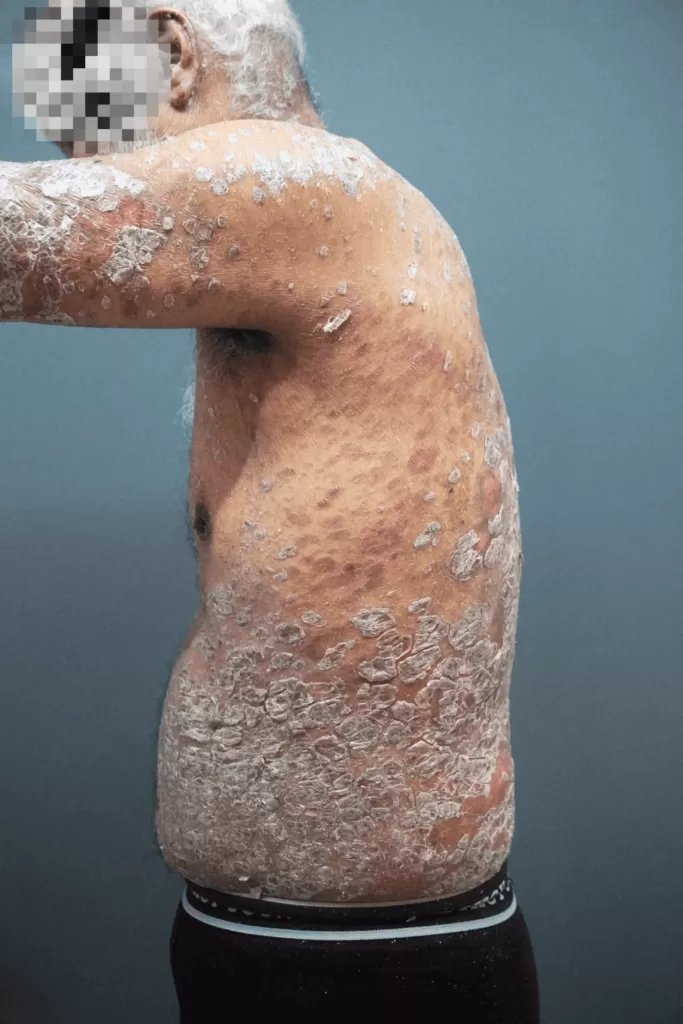
The patient had been battling psoriasis for 13 years, beginning with scalp involvement and gradually progressing to generalized plaques across his body. Despite consulting with numerous dermatologists, his condition worsened, evolving into erythrodermic psoriasis. This form of the disease led to intermittent exacerbations, causing him considerable discomfort and distress. Unfortunately, his active lesions eventually became resistant to conventional treatments, including corticosteroids and immunosuppressants.
A Complex Medical Background
In addition to his psoriasis, the patient had a complex medical history. He was diagnosed with diabetes mellitus, hypertension, ischemic heart disease (IHD), dyslipidemia, and hypothyroidism. His most recent exacerbation followed a myocardial infarction, highlighting the interconnected nature of his physical health and his skin condition.
The Turning Point: Homeopathic Intervention
Detailed Case Analysis
When the patient sought homeopathic treatment, a comprehensive case analysis was conducted. This process revealed several critical factors contributing to his condition:
- Family History: A strong genetic predisposition to psoriasis was noted, as several family members also suffered from the condition.
- Psychological Stress: The patient had experienced significant stress since childhood, primarily due to his family’s poor financial condition. He was highly anxious and worried, and described himself as timid. He also had recurring dreams of falling from heights or into water, indicating deep-seated fears.
- Recent Events: The exacerbation of his psoriasis following a heart attack suggested a strong connection between his emotional and physical health.
The Homeopathic Approach
Based on these findings, a carefully selected homeopathic similimum was administered. This personalized treatment was aimed at addressing not only the physical symptoms of erythrodermic psoriasis but also the underlying emotional and psychological factors contributing to the disease.
The Outcome: A Remarkable Remission
Instantaneous Relief
To the patient’s astonishment, the homeopathic treatment brought about an almost immediate remission of his psoriasis. The severe, treatment-resistant lesions began to heal, and the widespread inflammation subsided. This outcome was particularly significant, given that his condition had been unresponsive to conventional treatments.
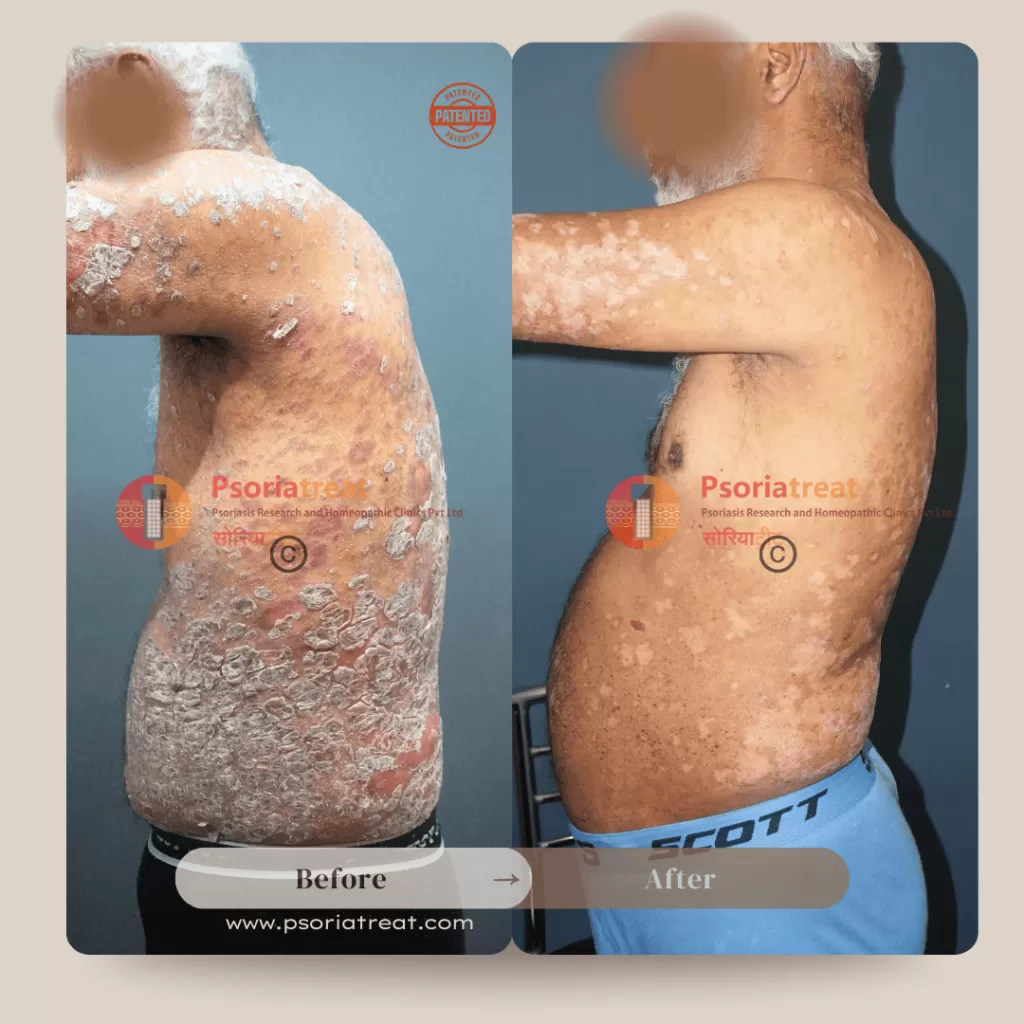
Holistic Healing
This case underscores the importance of a holistic approach in treating complex conditions like erythrodermic psoriasis. By addressing the patient’s physical, emotional, and psychological needs, homeopathy succeeded where conventional medicine had failed. The remission was not just a temporary relief but a significant step towards long-term healing and well-being.
If you are suffering from any type of psoriasis and searching for treatment without any side effects then get in touch by submitting your details below and we will get back to you
Erythrodermic Psoriasis Treatment: Guidelines and Best Practices
Homeopathy offers a positive and holistic approach to managing erythrodermic psoriasis. Homeopathy treats the whole person rather than just the symptoms, providing a personalized remedy that aligns with the individual’s unique physical and emotional state. This gentle yet effective approach can complement conventional therapies, potentially enhancing overall outcomes and offering relief where other treatments may fall short. By addressing both the physical and emotional aspects of the condition, homeopathy can contribute to a more balanced and positive path to remission.
Understanding Erythrodermic Psoriasis
Erythrodermic psoriasis is a rare but severe form of psoriasis that can cover almost the entire body with a red, peeling rash. This condition requires prompt and effective treatment due to its potential to disrupt the body’s ability to regulate temperature and lead to severe complications.
Conventional Treatment Options
- Corticosteroids: Often used to reduce inflammation and slow the overproduction of skin cells.
- Immunosuppressants: Drugs like methotrexate or cyclosporine are commonly prescribed to modulate the immune response.
- Biologics: Targeted therapies that address specific pathways involved in psoriasis, such as TNF inhibitors or IL-17 inhibitors.
Homeopathy as a Treatment of Choice
For patients like the one described above, who do not respond to conventional treatments, homeopathy offers a viable alternative. Homeopathic treatment is tailored to the individual, considering the whole person rather than just the disease. This approach can lead to significant improvements, particularly in cases of erythrodermic psoriasis where conventional options are limited.
Treatment Guidelines and Up-to-Date Approaches
When considering erythrodermic psoriasis treatment, it is essential to stay informed about the latest guidelines and advancements. Homeopathic treatments should be chosen based on a comprehensive understanding of the patient’s history, current condition, and overall health. As more patients seek out holistic and integrative approaches, homeopathy is gaining recognition as a valuable component of an up-to-date treatment strategy for erythrodermic psoriasis.
Conclusion: A New Hope for Psoriasis Patients
This case highlights the potential of homeopathic treatment for erythrodermic psoriasis, particularly in patients who have exhausted conventional options. By considering the patient’s complete medical history, emotional state, and unique symptoms, homeopathy can offer a path to remission and long-term health. For patients and practitioners alike, this case serves as a reminder that healing is not just about treating the disease but caring for the whole person.
Erythrodermic Psoriasis Treatment Photos
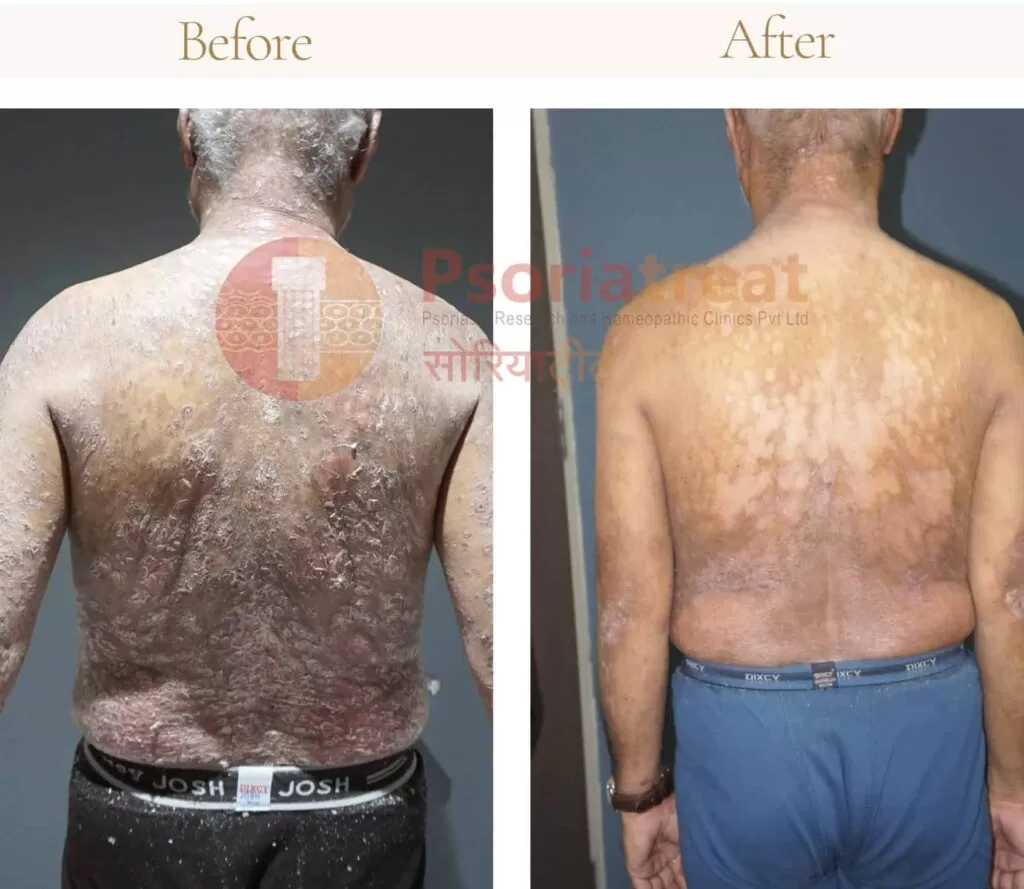
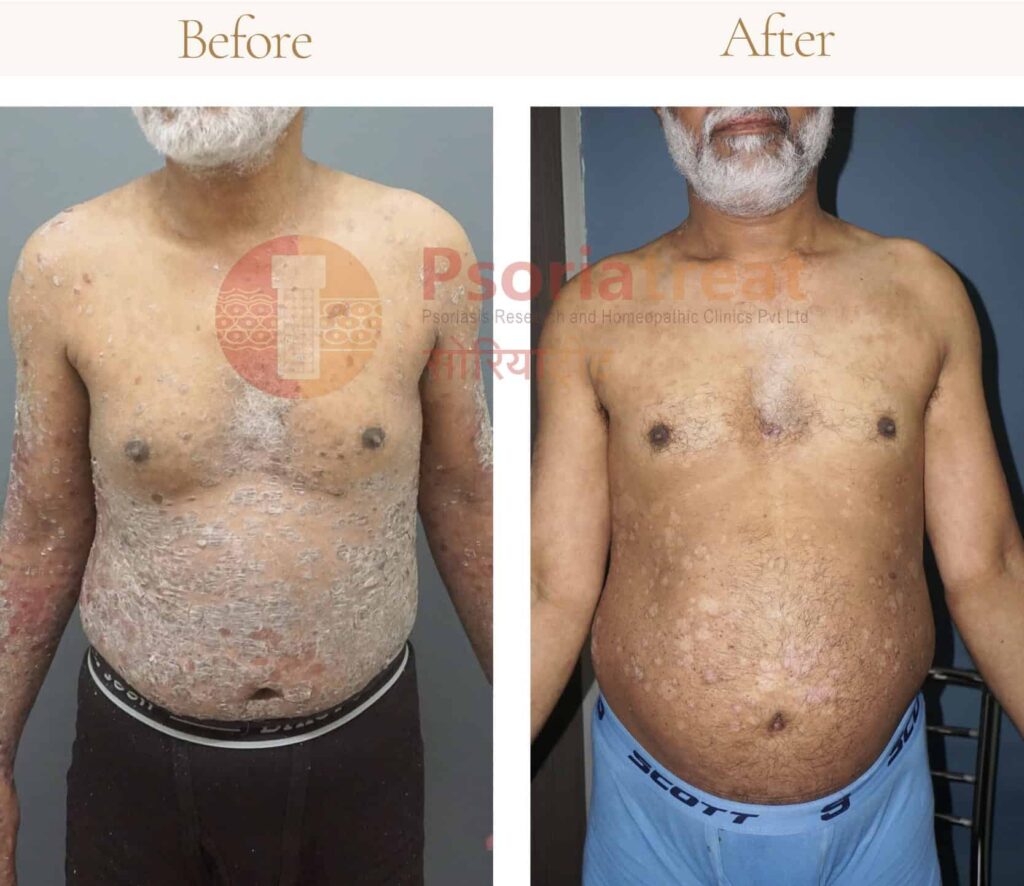
FAQs on Erythrodermic Psoriasis Treatment using Homeopathy
What is erythrodermic psoriasis, and how does it differ from other types of psoriasis?
Answer:
Erythrodermic psoriasis is a severe form of psoriasis that can cover most of the body with a red, peeling rash. Unlike other types of psoriasis, which may present as localized plaques, erythrodermic psoriasis involves widespread inflammation, making the skin appear bright red and inflamed. It is often associated with severe itching, pain, and can lead to serious complications, such as temperature regulation issues and infections.
What are the conventional treatment options for erythrodermic psoriasis?
Answer:
Conventional treatment options for erythrodermic psoriasis include corticosteroids to reduce inflammation, immunosuppressants like methotrexate or cyclosporine to modulate the immune system, and biologics that target specific pathways involved in psoriasis, such as TNF inhibitors or IL-17 inhibitors. These treatments aim to control the rapid turnover of skin cells and reduce inflammation.
How can homeopathy help in treating erythrodermic psoriasis?
Answer:
Homeopathy treats erythrodermic psoriasis by addressing the patient’s overall health, including physical, emotional, and psychological factors. A well-selected homeopathic remedy, or similimum, is tailored to the individual’s specific symptoms and underlying conditions. This holistic approach can lead to significant improvement, especially in cases where conventional treatments have failed. Homeopathy can offer a gentler, personalized treatment option that focuses on long-term healing.
What should I expect during a homeopathic consultation for psoriasis?
Answer:
During a homeopathic consultation for psoriasis, the practitioner will take a detailed history that includes your medical background, family history, emotional and psychological state, and specific symptoms. The goal is to understand the whole person and identify the root cause of the psoriasis. Based on this comprehensive analysis, the homeopath will select a remedy that matches your individual case. The treatment aims for holistic healing and symptom relief.
Is homeopathy recognized in the current guidelines for erythrodermic psoriasis treatment?
Answer:
While homeopathy is not typically included in conventional medical guidelines for erythrodermic psoriasis treatment, it is gaining recognition as a complementary and alternative medicine. Many patients who do not respond to standard treatments find relief through homeopathy. It is important to consult with a qualified practitioner to ensure that homeopathic treatment is appropriate for your specific condition, and it can be integrated into a broader, personalized treatment plan.
What are the symptoms of erythrodermic psoriasis?
Answer:
Erythrodermic psoriasis symptoms include widespread redness and scaling of the skin, intense itching or burning, skin pain, rapid shedding of skin in large sheets, and fluctuations in body temperature. This severe condition can affect nearly the entire body, leading to serious complications if not treated promptly.
What is the definition of erythrodermic psoriasis?
Answer:
Erythrodermic psoriasis is a rare and severe form of psoriasis characterized by extensive inflammation and exfoliation of the skin, covering more than 90% of the body surface. It often occurs in people with unstable plaque psoriasis and can be life-threatening due to its potential to disrupt the body’s ability to regulate temperature and fluid balance.
What are the pathology outlines of erythrodermic psoriasis?
Answer:
The pathology of erythrodermic psoriasis involves extensive epidermal hyperplasia, parakeratosis, and a loss of the granular layer of the skin. The dermis often shows a dense inflammatory infiltrate, predominantly composed of T-cells, with prominent dilation of dermal capillaries, contributing to the characteristic redness.
What is the histopathology of erythrodermic psoriasis?
Answer:
Histopathology of erythrodermic psoriasis typically reveals features such as acanthosis (thickening of the epidermis), Munro microabscesses, spongiform pustules, and elongated rete ridges. The extensive inflammatory infiltrate in the dermis, along with the loss of the granular layer and parakeratosis, are key histological features.
What is erythrodermic psoriasis called in Hindi?
Answer:
In Hindi, “erythrodermic psoriasis” can be referred to as “संपूर्ण त्वचा पर सोरायसिस” or “पूर्ण शरीर पर सोरायसिस.” This term describes the condition as psoriasis affecting almost the entire skin surface.
एरिथ्रोडर्मिक सोरायसिस एक गंभीर प्रकार का सोरायसिस है जो पूरे शरीर पर लाल, छिलने वाली त्वचा के साथ फैल जाता है। इसमें त्वचा की परतें तेजी से छिलती हैं, जिससे गंभीर खुजली और जलन होती है। यह स्थिति शरीर के तापमान को नियंत्रित करने की क्षमता को प्रभावित कर सकती है और गंभीर जटिलताओं का कारण बन सकती है। इस बीमारी का इलाज समय पर और प्रभावी ढंग से करना आवश्यक है, जिसमें सामान्य उपचारों के साथ होमियोपैथिक दृष्टिकोण भी सहायक हो सकता है।
frequently searched keywords
erythrodermic psoriasis definition, erythrodermic psoriasis pathology outlines, erythrodermic psoriasis histopathology, erythrodermic psoriasis in Hindi, erythrodermic psoriasis ICD 10, erythrodermic psoriasis treatment, erythrodermic psoriasis treatment of choice, erythrodermic psoriasis treatment guidelines, erythrodermic psoriasis treatment uptodate, erythroderma psoriasis treatment,
you may also like to read this happy case of psoriasis: Chronic Plaque Psoriasis Treatment Guidelines

